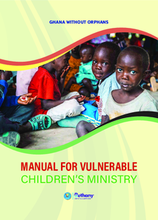The ability to have children is a special blessing from God to man since creation (Gen. 1:28). Hence Jesus’ recognition of children as heirs of God’s Kingdom. From one generation to another, humans also have the same blessing to reproduce and remain custodians of the earth and worshippers of God.
Beyond Biblical recognition, societies all over the world pay attention to the wellbeing and development of children because they constitute a vulnerable group. Children are adorable and have potentials for the world’s future, yet weak and fragile. They may be adaptable, resilient, and eager to learn, yet require protection and guidance. Therefore, it is not surprising the protection and care of vulnerable children are essential in every culture and social establishment including the church. The influence of Christianity in shaping the way vulnerable children are cared for in society can be traced to the early days of the church.
According to James 1:27 true religion is demonstrated by the care of the fatherless and widows. In the Roman Empire, Christians were noted for their fierce advocacy against child abuse and the adoption of abandoned babies (Bareither, 2019). However, Benz and Lindberg (2020) recount a gradual shift towards orphanages from the 4th century, which was continued in the middle ages mainly by monasteries. According to them, orphanages became popular with most churches having an orphanage. In the 17th century, the orphanages took the form of schools after the model of August Hermann Francke (a Lutheran clergy noted for his orphanage). However, the approach to caring for orphans and vulnerable children started changing when Johann Friedrich Oberlin, another Lutheran pastor from Alsace, initiated the Comprehensive Care For Individuals And Communities, which provided services that strengthened communities to care for children better, both effectively and efficiently (Benz and Lindberg, 2020).
Moreover, scientific evidence emerging after World War II, corroborated that the best environment for the wellbeing and development of children is the family and sparked a significant change in focus from the orphanages’ system to family-centred care (Jolley & Shields, 2009). The United Nations for that matter enacted the Convention on the Rights of Children (UNCRC) in 1990 and the UN Guidelines on Alternative Care (UNGAC) in 2010 to safeguard children globally and set standards on how children should be cared for in case of emergency. The UNCRC and UNGAC emphasise the need to keep children in families always, with orphanages serving as the last option for children, who will be moved into a family in the shortest possible time (UN, 1990; UN, 2010). Ghana was the first nation to ratify the UNCRC on 29th June 1990 (BCN and UNICEF, 2015).
As such, the Children’s Act, 1998 (560) and the Children’s Amendment Act 2016 (937) prioritise family centred care for children and prohibit any effort to separate children. Also, the Child and Family Welfare Policy of Ghana emphasises the need to prevent family separation, insisting that poverty alone cannot justify any attempt to separate a child from a family (Ministry of Gender, Children and Social Protection, 2015).
Despite these legal provisions, many children remain in orphanages with several lacking significant service in families (NDPC, 2020). Though the state has the responsibility of caring for vulnerable children, the role of the church continues to be paramount in ensuring children are protected in families (Bareither, 2019). Ghana’s culture for caring for vulnerable children traditionally centres on families, mostly the extended family (Frimpong-Manso, 2014). However, changing trends and economic hardships have affected this phenomenon (BCN&UNICEF, 2015). In 2007, the government of Ghana introduced a Care Reform Initiative (CRI) intending to change focus from orphanages to family-based care, but the Ghanaian society continues to depend largely on institutions (BCN &UNICEF, 2015). As of 2016, a total of 95 Residential Homes for Children (RHC), cared for 2,900 children with 85% of them being separated from at least a living parent (Hickman, Adams & Country Core Team, 2018). Also, 32 children were in foster care though 89 foster parents were available (Ministry of Gender, Children and Social Protection, 2018). In 2014, the number of children living on the streets in Accra alone had risen to about 90,000 (Asante, 2014).
An extended version of the CRI known as the Accelerating Child Care Reform Programme was also implemented from 2015 to 2020 to support the implementation of the CRI (Ministry of Gender, Children and Social Protection, 2018). As a result, manuals and tools have been developed to guide the implementation of foster care and adoption services in Ghana. Lessons from the history of child care indicate that the role of Ghanaian churches cannot be ignored in making adoption and foster care a reality in Ghana (Bareither, 2019; Benz and Lindberg, 2020). Ghana’s 71% Christian population (GSS, 2010) buttress the role of the church especially in advocating for family-based care. Churches can establish vulnerable children’s ministry to support the recruitment of foster and adoptive parents and care of vulnerable children in communities. This will not only solve a national problem but enhance discipleship in churches as required by the great commission (Matt 28:19-20).
For the above reason, Ghana Without Orphans (GWO), a movement of Christians and organisations working to promote family-based care, with the support of Bethany Christian Services Global has developed this manual to encourage and guide churches through the process of establishing a ministry to care for vulnerable children. This manual demonstrates God’s plan for vulnerable children with Biblical examples. It guides the user through 8 steps to launching a ministry for vulnerable children, adapted from the work of Jason Weber and Paul Pennington (2009).

